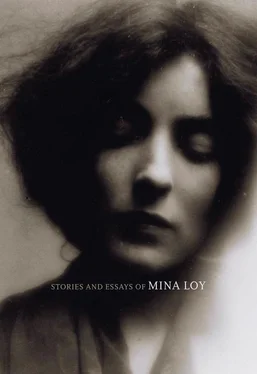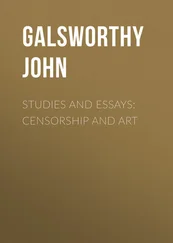Mina Loy - Stories and Essays of Mina Loy
Здесь есть возможность читать онлайн «Mina Loy - Stories and Essays of Mina Loy» весь текст электронной книги совершенно бесплатно (целиком полную версию без сокращений). В некоторых случаях можно слушать аудио, скачать через торрент в формате fb2 и присутствует краткое содержание. Год выпуска: 2011, Издательство: Dalkey Archive Press, Жанр: Современная проза, на английском языке. Описание произведения, (предисловие) а так же отзывы посетителей доступны на портале библиотеки ЛибКат.
- Название:Stories and Essays of Mina Loy
- Автор:
- Издательство:Dalkey Archive Press
- Жанр:
- Год:2011
- ISBN:нет данных
- Рейтинг книги:3 / 5. Голосов: 1
-
Избранное:Добавить в избранное
- Отзывы:
-
Ваша оценка:
- 60
- 1
- 2
- 3
- 4
- 5
Stories and Essays of Mina Loy: краткое содержание, описание и аннотация
Предлагаем к чтению аннотацию, описание, краткое содержание или предисловие (зависит от того, что написал сам автор книги «Stories and Essays of Mina Loy»). Если вы не нашли необходимую информацию о книге — напишите в комментариях, мы постараемся отыскать её.
Stories and Essays of Mina Loy
Stories and Essays of Mina Loy — читать онлайн бесплатно полную книгу (весь текст) целиком
Ниже представлен текст книги, разбитый по страницам. Система сохранения места последней прочитанной страницы, позволяет с удобством читать онлайн бесплатно книгу «Stories and Essays of Mina Loy», без необходимости каждый раз заново искать на чём Вы остановились. Поставьте закладку, и сможете в любой момент перейти на страницу, на которой закончили чтение.
Интервал:
Закладка:
So here we have “Psychoanalysis And The Unconscious” by D.H. Lawrence, where the almost lyrical prose of the Women in Love is also converted ——to candy.
Thus: “But sweet heaven what merchandise. What dreams dear heart! What was there in the cave?
Alas that we ever looked!
Nothing but a huge slimy serpent of sex ——”
Which transposed to the economic style of “modernism” would run something like this —
“Sweet heart Alas ‘Cave serpent ——’em’ ”!
Inevitably Lawrence like other converts whose reputation makes it imperative that they preserve their independence, compiles some ingenious terminology of his own and indulges in the well known truc of the distinguished disciple, in seeking a quarrel with his master.
With his tour de force ——locating “I Am That I Am” in the Solar Plexus he has dangerously damned his own creative flux with a theory, and is already regarding the polarised navel of the infant Jesus through the eye of his pen.
He tells us that “Psycho-Analysis is out under the therapeutic disguise to do away with the moral faculty in man”. My observation of every strata of society leads me to conclude that man has never exhibited the least inclination towards a moral faculty ++++++++++ ——However what I really wished to say is that Mr. Lawrence has arrived at this rather obvious conclusion in the superficial dimension +++++++++ Too late.
If Freud is not in the pay of the Jesuits, the omission should be immediately remedied. For he, contrary to Mr. Lawrence’s assertion is in a fair way to accomplish — what the Fathers of the church so signally failed to accomplish — the purification of the race.
Already the élite in protest at the epidemic of psycho-exhibitionism among the merely cultured, are dropping “sex” entirely from their programme.
Psycho-Analysis has raised sex to the venerable status of a duty; and WHO ———wants to do his duty?
GATE CRASHERS OF OLYMPUS—
The somersault of society dates from the day that a small Spaniard, P.O. Casse ( cf. French breakage) so inevitably exhibited the portrait of a wine glass, “looking both ways at once”.
Every new object to which he applied his disruptive aesthetic has had an extra crack knocked into it by his rabid opposers, i.e. disciples.
For although modern warfare is not responsible for our revaluation of values, modern art which is the actual cause is martialised to the extent that he who steals a stunt from its originator, does so, for the redemption of the aforesaid art.
I have heard that the original wine glass was broken by Braque, i.e. cf. break. Or at least that he broke another on the same day—
However I predict that the breakage of P.O. Casse will be canonised by the dealers — for he has successively broken a greater variety of objects, and with more rapidity than his most ardent opponents (i.e. disciples) could keep up with.
Example.
P.O. Casse broke a guitar — which prophetic pattern induced an aesthetic intimation comparable to what in other areas, the French call frisson .
This disjuncted guitar has in every “avant guard” every year, in every land re-re-re-represented the imminent intellectual revolt for one quarter of a century.
The same guitar — often seen believe me — broken at the same place — yet bearing a variety of signatures.
No head or tail of reason for this save that emancipation being contagious, if caught by the noncreative finds only the sexual un-confines in which or wherein to flower—
Magazine slogan—
Art is always “new” to the uninitiate—
GERTRUDE STEIN
Twenty years ago, people used to say to me, “the days when a genius could appear suddenly, and be unappreciated, are well and truly gone.”
They said we were so very civilized, so blasé in the face of any conceivable surprise, that no-one could ever again leave the critics baffled.
Bizarrely, however, our culture is destined to find that any truly new thought will burst upon it like a fury. And it is to this destiny that the critics have once more succumbed in the case of Gertrude Stein.
For nearly twenty years, Gertrude Stein built up her œuvre, in relation to which our culture allowed nothing to see the light save the odd bit of bullying from the wittier journals.
She went on building her œuvre, in a manner which — despite established usage in such cases — I shall not call courageous (for only the most vulgar error could lead us to believe that the enlightened have need of courage in the face of the unenlightened), but rather serene. And the slight, contented smile with which she met the bullying to which she was subjected pleased me immensely.
She knew full well just how her brain’s slightest act, once it had been deformed by ridicule, would land amidst the literature of her time like a chemical precipitate.
She has prodigiously dismantled the raw materials of style, and radically swept clean the literary arena, making new performances possible. Which has given rare courage to countless young people.
In America, many an author has gained renown by following one of the paths opened up by Stein’s experiments. But Gertrude herself has been systematically undervalued in her own country, where for years now people have been crying out for a few properly American pioneers.
Well, here she is, the all-American pioneer! And once her unpublished manuscripts had been mined for all manner of riches, it was thanks to good old conservative England that this prophet from across the Atlantic was finally recognized.
Gertrude Stein is not a writer in any of the currently accepted senses of the word.
She does not use words to present a subject, but uses a fluid subject to float her words on.
I can point you toward what her art is made of by observing that you never hear anyone say, “I have read such and such a book by Gertrude Stein.” People say: “I have read some Gertrude Stein.”
I doubt any of her writings has appeared in French, especially as the essential feature of her work is its untranslatability into even its own language. For our obliging pioneer has reduced the English language to a foreign language even for Anglo-Americans.
And only her renown, which today is worldwide, and which she owes to the rude trials to which she has subjected the contemporary mind, could lead any audience to criticize what I have just said as a meaningless paradox.
Perhaps much of the opposition unleashed against Gertrude Stein stemmed from the fear of those people who claimed to be stunned.
If ever I let myself go so far as to understand all this — one fine morning I would no longer be able to — order my breakfast.
HAVELOCK ELLIS
About 1920 Havelock Ellis told me that in England where the mothers had silently put up with marriage, women were beginning to suspect marriage — they had enquired as to what their mothers had got out of marriage, and what they got out of it, said Ellis, “was nothing .” Ninety percent of the women in England he assured me found no pleasure in marriage—“and when I put it at ninety percent I’m putting it quite low.”
In 1912, a British “beauty” told me that she alone among all her friends — was not incommoded and thus horrified by her marital duty; they tried every way to avoid it — — “and they’re in love with their husbands, the finest handsomest men in England.” She attributed her exemption from their “agony” to her husband having been attaché to the British Embassy in Paris — — where he had learned — –
That on Lord ——’s “first night” his bride enquired in ecstatic surprise —
Читать дальшеИнтервал:
Закладка:
Похожие книги на «Stories and Essays of Mina Loy»
Представляем Вашему вниманию похожие книги на «Stories and Essays of Mina Loy» списком для выбора. Мы отобрали схожую по названию и смыслу литературу в надежде предоставить читателям больше вариантов отыскать новые, интересные, ещё непрочитанные произведения.
Обсуждение, отзывы о книге «Stories and Essays of Mina Loy» и просто собственные мнения читателей. Оставьте ваши комментарии, напишите, что Вы думаете о произведении, его смысле или главных героях. Укажите что конкретно понравилось, а что нет, и почему Вы так считаете.












